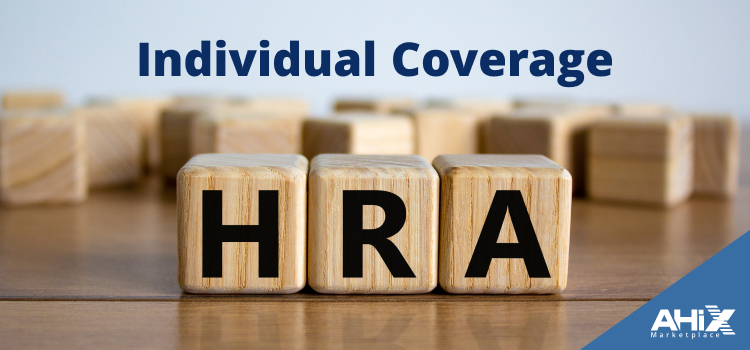Health insurance costs have been rising for both businesses and workers, creating pressure on budgets and limiting choices. The Individual Coverage Health Reimbursement Account (ICHRA) is designed to solve this challenge by offering flexibility and cost control. Unlike traditional group health insurance, where employers carry the burden of selecting one plan for everyone, ICHRA allows employers to set a defined budget while employees choose the individual health plan that fits their needs. This approach makes ICHRA a win-win solution: employers save by controlling costs, and employees save by finding coverage that matches their preferences and budgets.
In this blog, we’ll explore how ICHRA for employers creates financial relief and flexibility, while also showing why many employees see it as a smarter alternative to traditional health insurance.
What Is ICHRA (Individual Coverage HRA)?

The Individual Coverage Health Reimbursement Account (ICHRA) is a type of health benefit that allows employers to give money to employees for their health insurance costs. Instead of offering one group health plan for everyone, employers set a budget, and employees use that money to buy their own health insurance.
This approach is different from traditional group insurance where the employer picks a single plan that may not fit every worker’s needs. With ICHRA, each employee gets the freedom to choose from a wide range of individual health insurance options such as plans from the ACA Marketplace or private insurers.
For employers, this means they can control costs while still providing a valuable benefit. For employees, it means they get more choice, more flexibility, and a plan that suits their health needs and budget.
Why Employers Are Turning to ICHRA
Rising health insurance costs make it hard for many businesses to keep offering traditional group plans. Premiums often increase every year, leaving employers with two choices: either pay more or reduce coverage. Neither option works well in the long run.
With ICHRA for employers, the approach is different. Instead of covering unpredictable group premiums, companies decide how much money they want to give each employee for health coverage. This fixed budget gives employers more control over their spending while still offering a valuable benefit.
Employers also avoid the challenge of trying to pick one health plan that works for everyone. With ICHRA, each employee makes that choice for themselves, so businesses can provide support without carrying the burden of plan selection.
For many companies, this combination of cost control, flexibility, and reduced risk is the reason ICHRA has become an attractive alternative to group health insurance.
How ICHRA Works for Employees
For employees, ICHRA works in a straightforward way. Once an employer sets a monthly allowance, the employee can use that money to buy their own health insurance plan. This could be through the ACA Marketplace or directly from a private insurer.
Here’s how the process usually looks:
1. The employer decides the allowance – a fixed amount is set for each worker.
2.Employees choose a plan – based on their budget, preferred doctors, and coverage needs.
3.Reimbursement – employees submit proof of their insurance premium, and the employer reimburses them up to the allowance.
This setup gives employees the power to choose a plan that truly fits their lifestyle. Someone who wants a wider doctor network can select it, while another person may prefer a lower premium option. Instead of being locked into a one-size-fits-all group plan, employees can shape their own coverage.
This explains clearly how ICHRA works for employees, and why many see it as a more flexible approach to health insurance.
Cost Savings with ICHRA for Employers and Employees

One of the biggest reasons companies and workers are interested in ICHRA is the savings it can create. Unlike group insurance, where premiums often increase each year and employers bear most of the cost, ICHRA allows both sides to spend more wisely.
Savings for Employers
- Budget control: Employers decide the allowance in advance, which helps avoid sudden cost increases.
- No premium surprises: Instead of being tied to a single group policy, companies only pay what they’ve promised as reimbursement.
- Better use of funds: Small businesses, start-ups, and even larger employers can match their contributions to what they can realistically afford.
Savings for Employees
- Freedom of choice: Employees can compare plans and choose one that matches their personal healthcare needs and financial situation.
- Tax-free reimbursements: Money received through ICHRA is not taxed, which means more value in the employee’s pocket.
- Potentially lower premiums: By shopping on the marketplace, employees may find affordable plans or qualify for subsidies.
Together, these advantages show why ICHRA savings are meaningful for both sides. Employers gain cost predictability, while employees gain flexibility and often pay less out of pocket.
Are ICHRA Plans Good for Employees?

Many employees wonder whether ICHRA is actually a good deal for them. The answer depends on what they value most in their health coverage.
Why ICHRA Can Be a Good Choice
- Personalized coverage: Instead of being stuck with a single group plan, employees choose the insurance that matches their health needs and family situation.
- Portability: The plan belongs to the employee, not the employer. If they change jobs, they can keep their coverage.
- Extra financial value: Reimbursements through ICHRA are tax-free, which stretches the money further compared to taxable wages.
Things Employees Should Consider
- Plan shopping takes effort: Employees must compare plans on their own, which may feel overwhelming at first. Marketplaces like AHiX can make this process easier by allowing employees to compare multiple insurance options in one place.
- Variation by location: The number of available health plans depends on the state and marketplace options where the employee lives.
Overall, for many workers, ICHRA is good for employees because it puts them in control of their health insurance. While it requires more involvement in choosing a plan, using resources like AHiX Marketplace can simplify the experience and help employees find better value.
ICHRA Pros and Cons for Employees and Employers

When deciding whether ICHRA is the right choice, it helps to look at the advantages and possible drawbacks for both sides.
Pros for Employees
- Choice and control: Employees can pick a plan that matches their health needs and budget.
- Portability: The insurance belongs to the employee, so they can keep it if they switch jobs.
- Tax-free reimbursements: Money received through ICHRA does not count as taxable income, which means greater value.
- Marketplace support: Platforms like AHiX Marketplace make it easier to compare options side by side, reducing confusion.
Cons for Employees
- Plan shopping: Choosing from multiple plans may feel overwhelming for those unfamiliar with insurance terms.
- Location limits: Availability of plans depends on the employee’s state or marketplace options.
Pros for Employers
- Budget predictability: Employers decide in advance how much to contribute, avoiding unexpected premium hikes.
- Recruitment and retention: Offering ICHRA can make businesses more attractive to potential employees.
- Flexibility in design: Employers can vary allowances by job class, location, or family status.
- Compliance-friendly: ICHRA meets ACA requirements when set up correctly, giving peace of mind.
Cons for Employers
- Education needed: Employers must help employees understand how to shop for plans.
- No one-size-fits-all plan: Some businesses may prefer the simplicity of offering a single group plan.
Comparison: ICHRA vs Group Health Insurance
| Feature | Group Health Insurance | ICHRA (Individual Coverage HRA) |
|---|---|---|
| Plan Choice | One plan chosen by the employer | Employees pick their own individual plans |
| Cost for Employers | Premiums often rise each year, hard to control | Employers set a fixed allowance (predictable) |
| Flexibility | Limited, same plan for all employees | Works for diverse teams and remote workers |
| Portability | Coverage ends if employee leaves the job | Employee keeps their individual plan |
| Employee Experience | May not meet everyone’s needs | Personalized to fit health and budget |
| Compliance | Employer must maintain group plan requirements | ACA-compliant when set up properly |
Who Benefits Most from ICHRA?

ICHRA can be helpful in many situations, but certain employers and employees see the strongest benefits.
Employers Who Benefit
- Small and mid-sized businesses: Companies that struggle with the rising cost of group health insurance can set a clear, affordable budget through ICHRA.
- Start-ups and growing firms: Fast-growing teams often need a benefits solution that can scale. ICHRA allows them to add employees without worrying about group plan renewals.
- Multi-location or remote teams: Group insurance can be difficult when employees live in different states. With ICHRA, each employee chooses a plan available in their area.
Employees Who Benefit
- Workers who want choice: Employees get to pick a plan that fits their personal health needs, family size, and preferred doctors.
- Frequent job changers: Since the plan belongs to the employee, they don’t lose coverage when they leave a job.
- Budget-conscious employees: Many find plans that cost less than group coverage, making their allowance go further.
By addressing the needs of both sides, ICHRA for employers becomes a flexible option that works especially well in today’s diverse and mobile workforce.
How to Get Started with ICHRA?
Setting up an ICHRA is simpler than it may sound. Here’s a clear breakdown of how employers and employees can begin:
Steps for Employers
1. Decide on the budget – Employers choose how much money they want to offer each month for health coverage. This amount can be the same for everyone or vary by job role, location, or family size.
2. Create the reimbursement plan – Employers outline the rules for what can be reimbursed (for example, monthly premiums, or other eligible health expenses).
3. Partner with a marketplace or administrator – Working with a platform like AHiX Marketplace can make the process smoother by handling compliance, reimbursements, and helping employees shop for plans.
4. Communicate with employees – Clear communication is key. Employers should explain how the allowance works and what steps employees need to take.
Steps for Employees
1. Shop for a health plan – Employees use their employer’s allowance to choose coverage that fits their needs, either through the ACA Marketplace or a platform like AHiX.
2. Submit proof of coverage – After enrolling, employees provide proof of their plan to their employer or plan administrator.
3.Receive reimbursement – Each month, employees are reimbursed for premiums or approved expenses, up to the allowance set by the employer.
Getting started with ICHRA is about making choices upfront. Employers gain a predictable way to provide health benefits, while employees enjoy the freedom to pick the coverage that works best for them. Platforms like AHiX Marketplace make the transition easier by guiding both sides through the process.
Conclusion: Smarter Health Insurance with ICHRA for Employers and Employees
The rising cost of health insurance has made it harder for both companies and workers to find affordable coverage. The Individual Coverage Health Reimbursement Account (ICHRA) offers a modern solution by giving employers control over their benefit spending while allowing employees to choose the plan that works best for them.
For employers, ICHRA means predictable costs and a benefit that can grow with their business. For employees, it means freedom of choice, tax-free reimbursements, and the ability to keep coverage even if they change jobs. Together, these advantages show why ICHRA for employers and employees alike is becoming one of the most practical health benefit options today.
As more businesses adopt this approach, marketplaces like AHiX are making it easier to compare plans and manage the transition. With the right setup, ICHRA creates a win-win: employers save money, and employees gain coverage that truly fits their needs.
FAQs:
1. Can ICHRA be offered to part-time employees?
Yes. Employers can include part-time workers in an ICHRA as long as everyone in the same employee class is treated the same. This is helpful for mixed workforces.
2. Does ICHRA replace traditional group health insurance?
Not always. Some employers use ICHRA instead of a group plan. Others offer it alongside a group plan so employees can choose what works best.
3.Can employees use ICHRA funds for dental or vision coverage?
Often, yes. Depending on how the employer sets the rules, ICHRA can reimburse dental and vision premiums in addition to medical insurance.
4. Are ICHRA allowances the same for every employee?
No. Employers can set different amounts by job role, location, age, or family size, but must treat everyone within the same class equally.
5. How does ICHRA handle employees in different states?
It works well. Each employee buys an individual plan in their own state, which makes ICHRA ideal for remote or multi-state teams.
6. Can employees still qualify for premium tax credits with ICHRA?
Sometimes. If the ICHRA is “affordable” under IRS rules, the employee cannot take premium tax credits. If it isn’t affordable, they may opt out and use credits instead.
7. What expenses can be reimbursed under ICHRA?
Usually monthly health insurance premiums. Employers may also allow other eligible medical expenses as defined by the IRS.
8. Is there a minimum number of employees required to offer ICHRA?
No. Businesses of any size even with one employee can offer ICHRA.
9. Can employers adjust ICHRA allowances each year?
Yes. Allowance amounts can be reviewed and changed annually to match budgets or growth.
10. Do employees need to use a specific insurance company with ICHRA?
No. Employees can choose any qualifying individual health plan that meets federal rules.
11. Can ICHRA be combined with an HSA (Health Savings Account)?
In some cases, yes. If paired with a high-deductible health plan and the ICHRA is set up correctly, employees may still contribute to an HSA.
12. What if an employee’s premium is higher than the ICHRA allowance?
The employee pays the difference out of pocket. The allowance lowers the cost but may not cover it fully.
13. Do seasonal employees qualify for ICHRA?
Yes. Employers can offer ICHRA to seasonal workers as a separate class, using the same rules for everyone in that class.
14. How quickly do employees get reimbursed under ICHRA?
Timing depends on the employer’s process. Many reimburse monthly after proof of payment is submitted; some may do it sooner.



